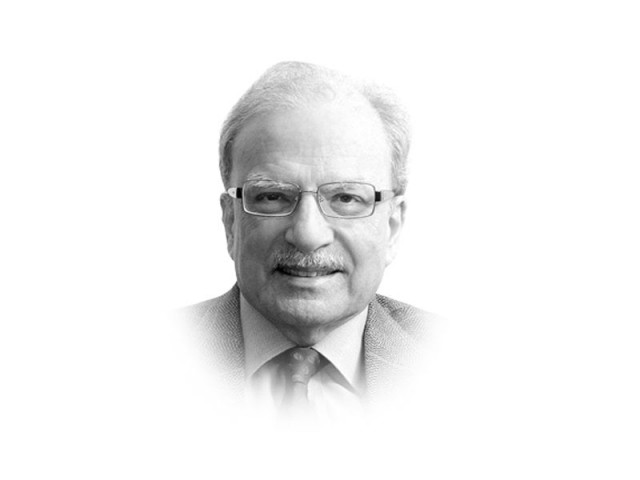US-China relations: a dilemma for Islamabad
The Chinese are the biggest holder of the United States’ foreign debt with more than $1 trillion

The writer is a former caretaker finance minister and served as vice-president at the World Bank
In his opening address, Minister Qureshi emphasised that Islamabad wished to maintain good relations with the United States. The fact that the United States’ president had spoken harsh words about Pakistan would not be allowed to affect relations between the two countries. He recognised that the United States-China relations were passing through some tense moments; these would not be factored into Pakistan’s dealings with the two countries. Since these words were spoken, the verbal duel between Washington and Beijing has heated up. Would Islamabad not be affected by the sharpening of the conflict between the two nations that have played supportive roles for Pakistan.
In his two speeches at the United Nations in the week of September 24 — one at the General Assembly and the other at the Security Council — President Donald Trump came out openly against what he termed Beijing’s meddling in his country’s internal affairs. He complained that in response to the imposition of tariffs by his administration on Chinese imports, Beijing had retaliated by imposing tariffs of its own aimed at American farmers and other politically-sensitive constituencies in the states that support him. “They do not want me or us to win because I am the first president ever to challenge China on trade, and we are winning on trade — we are winning on every level,” he told the press after his two speeches.
China stiffly denied the president’s accusation. “We do not, and will not, interfere in any country’s domestic affairs,” said Wang Yi, the Chinese foreign minister. “We refuse to accept any unwarranted accusations.” But Trump did not back down. He wrote in a tweet that the Chinese had placed a four-page supplement in a mid-west newspaper, The Des Moines Register, and some other newspapers that highlighted the economic costs of Trump’s trade battle with China. The latest tit-for-tat brought a formal rejoinder from the Chinese side. “I believe the international community knows very well who is most used to meddling in the internal affairs of others,” Geng Shuang, a spokesman for the Chinese Foreign Ministry, told reporters in Beijing. Asked about The Des Moines Register’s placement of the ad, Geng said that the assertion that it amounted to election interference was “totally far-fetched and fictional.” But as suggested by Anna Field in The Washington Post, by selecting Des Moines, Iowa as the area of focus, the Chinese were reflecting their knowledge of the American political system. The fact that Iowa is the first to vote during presidential primary season gives it outsize influence over the US electoral process. “Second, it has special status in the bilateral relationship. Long before he became China’s president Xi traveled to Muscatine, Iowa to learn about agriculture.”
Mark Landler, a seasoned diplomatic correspondent working for The New York Times, wrote a long story for his newspaper based on what happened at the United Nations’ meetings. He cited his interview with a senior administration official who “cited an array of other Chinese propaganda efforts, including pressure on think tanks and film studios that distribute material critical of China, intimidation of Chinese-language media organisations in the United States and influence campaigns on college campuses with students and teachers.” But “China would not be the first country to use trade to achieve political ends in the United States,” he wrote in his coverage. In the 1980s, the Japanese strategically placed auto plants and their suppliers in critical congressional districts, hoping to head off any action against its auto industry.
Other American leaders joined the American president to be openly critical of China. In a speech delivered on October 4 at Hudson Institute, a conservative Washington-based think tank, Vice President Mike Pence warned of a tougher approach towards Beijing. The Chinese seemed to be getting exhausted by the constant attacks on their country by the senior leaders in the Trump administration. They gave cold treatment to US Secretary of State Mike Pompeo’s five-hour visit to Beijing on his way back from Pyongyang. Three meetings had been slotted for him, with the Chinese Foreign Minister, Yang Jiechi, a Politburo member who has dealt with bilateral relations and finally with President Xi Jinping. The Xi meeting did not take place. The snub was felt by Trump. That China was redoubling its efforts to protect its slowing economy from the effects of the trade war, provided fresh evidence for President Trump’s claim that Washington enjoyed the upper hand in the deepening commercial conflict. In October China’s central bank, clearly nervous about a slowdown, pumped $175 billion into the economy by lowering the amount of money that some lenders are required to hold in reserve.
But China has choices where it could weaponise the US debt. This is often called the nuclear option .The Chinese are the biggest holder of the United States’ foreign debt with more than $1 trillion. Beijing could take a step back from buying the United States Treasuries — or worse dumping what they own on the open market. As an analyst speculated, “China has lately reduced its holdings of United States government debt, and a growing number of financiers, economists and geopolitical analysts are quietly raising the prospect that China may look at its ability to influence interest rates as its ultimate trump card.”
Published in The Express Tribune, October 15th, 2018.
Like Opinion & Editorial on Facebook, follow @ETOpEd on Twitter to receive all updates on all our daily pieces.















COMMENTS
Comments are moderated and generally will be posted if they are on-topic and not abusive.
For more information, please see our Comments FAQ